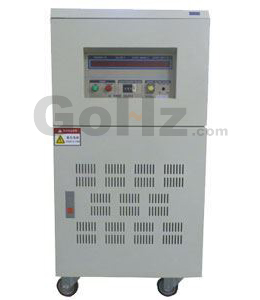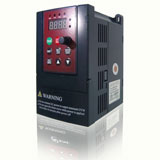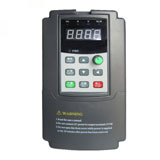HomeFrequency Converter
 For some applications need specific Hertz and Volts, you can buy a GoHz frequency converter for both single phase and three phase with a reasonable price, then you can convert Hertz from 40 Hz to 499.9 Hz, volts from 0-300V single phase and 0-520V three phase, for example:
For some applications need specific Hertz and Volts, you can buy a GoHz frequency converter for both single phase and three phase with a reasonable price, then you can convert Hertz from 40 Hz to 499.9 Hz, volts from 0-300V single phase and 0-520V three phase, for example:Convert single phase
110V 60Hz to 220V 50Hz;
230V 50Hz to 110V 60Hz;
120V 60Hz to 240V 50Hz;
... ...
Convert three phase
480V 60Hz to 400V 50Hz;
380V 50Hz to 460V 60Hz;
... ...
Both Hertz and Volts are adjustable in separate with better output pure sine wave.
On the 3 phase motor, you will have the following:
1. Hz on a 50 Hz - will turn slower ~20%. Since it's slower, cooling on the motor required less. It will see an increase of current load with V/Hz increase.
2. Hz on a 60 Hz - The motor will turn approximately 20% faster and this will lead to some heat issue as cooling required more. The V/Hz will drop without any increase of current draw though. Since the increased of load, it good to check the motor Full load Ampreage (FLA) on the motor nameplate to make sure if there is a need to mitigate some of the load to avoid burn out.
1. Hz on a 50 Hz - will turn slower ~20%. Since it's slower, cooling on the motor required less. It will see an increase of current load with V/Hz increase.
2. Hz on a 60 Hz - The motor will turn approximately 20% faster and this will lead to some heat issue as cooling required more. The V/Hz will drop without any increase of current draw though. Since the increased of load, it good to check the motor Full load Ampreage (FLA) on the motor nameplate to make sure if there is a need to mitigate some of the load to avoid burn out.
A single phase to three phase converter is a three phase star connected squirrel cage induction motor. It converts 380V single phase 50Hz (across UV input) to 380V three phase (UVW) with a slight unbalance (5%) in Voltage. It is used extensively on railways 25kV 50Hz electric locomotives for driving 150kVA three phase motor load of auxiliary drives like compressors, blowers, pumps...........more than a dozen.
Imagine a three phase motor running from three phase input; then one line gets disconnected. What happens may surprise many; the motor continues to run and deliver the load (but reduced torque) with slight drop in speed.The Voltage across the three phases remains (almost) unchanged and an unbalance of 5% may be expected. If balanced three phase output is required; Static inverter route is fine (as practiced in modern 25kV electric locomotives).
Imagine a three phase motor running from three phase input; then one line gets disconnected. What happens may surprise many; the motor continues to run and deliver the load (but reduced torque) with slight drop in speed.The Voltage across the three phases remains (almost) unchanged and an unbalance of 5% may be expected. If balanced three phase output is required; Static inverter route is fine (as practiced in modern 25kV electric locomotives).
Frequency converters can also impair productivity when a program is not sophisticated enough to meet application requirements. For example, in a web application, the frequency converter's PID parameters must be tuned to the optimum level in order to achieve maximum output without affecting the end product reliability. If the frequency converter designer does not incorporate into the software a simple way to tune these parameters, an optimum result will not be obtained. This can cause a direct reduction in productivity.
Frequency converters can be powerful tools in maintaining processes by using diagnostics to solve frequency inverter performance issues and troubleshoot related processes. An understanding of how the frequency converter interacts with the process can help you improve overall production and product quality. Many faults are caused by misapplication of the frequency converter. Process changes, such as variations in load or speed; power issues, such as capacity switching by the utility; or changes in environmental operating conditions are not immediately obvious, but could be a major contributor to frequency converter failure. Evaluate the consistency and condition of the process when trying to determine the cause of failure.
I'm hearing about using a frequency converter with my pump and motor
setup for better flow control instead of control valves. Is it worth it?
Do I still need some measure of flow control besides a shut-off valve? I think a frequency converter control can offer better efficiency, but
diminished control accuracy, response time and shut-off performance.
A frequency converters solution is no different than controlling the speed of a steam turbine in order to regulate flow from a compressor. It's just becoming more common, with advances in electronics and with the increased availability of frequency converters and motors for this service.
A frequency converters solution is no different than controlling the speed of a steam turbine in order to regulate flow from a compressor. It's just becoming more common, with advances in electronics and with the increased availability of frequency converters and motors for this service.
Simply words, a frequency converter is a power conversion device. The frequency converter converts a basic fixed-frequency, fixed voltage sine-wave power (line power) to a variable-frequency, variable-voltage output used to control speed of induction motors. Frequency converters also offer an additional benefit - increased bearing and pump seal life. By maintaining only pressure needed in pump to satisfy system requirements, pump is not subjected to any higher pressures than necessary.
Frequency converters are becoming almost standard part of aquatics equipment room packages. Most frequency converters are fairly simple to install and operate however, they are quite complex with respect to their sophisticated hardware and software implementations. Frequency converter functionality and operation can be greatly improved by understanding basic frequency converter theory, terminology and interfacing options.
 High quality frequency inverters for electric motor speed controls in energy-saving solutions.
High quality frequency inverters for electric motor speed controls in energy-saving solutions.
Search inverters
Category
inverters
Featured
 Single phase inverter normally is for small power electric motor speed adjustment applications, with single phase 220V to 240V input to three phase voltage ...
Single phase inverter normally is for small power electric motor speed adjustment applications, with single phase 220V to 240V input to three phase voltage ...
 This frequency inverter supplied by our factory integrated vector control function. This inverter can continuous running even if power supply off for a few ...
Frequency inverter manufacturers mainly focus on R&D in order to develop new and improved products, which offer more distinguished and revolutionary features ...
A frequency inverter changes output voltage frequency and magnitude to vary the speed, power, and torque of a connected induction motor to meet load conditions. ...
Frequency inverter reconstruction of Power Plant promoted heightening of economy benefit. Frequency inverter won acceptance of user as its high reliability, ...
Gozuk inverters are suitable in the fields of power, iron and steel, HVAC, oil, mine, construction, etc for the high-voltage motor's speed adjustment, energy ...
When adopting the frequency inverter to conduct speed adjustment, the fan speed will reduce from N1 to N2. As the fan's static pressure Pst=0, conforming to ...
This frequency inverter supplied by our factory integrated vector control function. This inverter can continuous running even if power supply off for a few ...
Frequency inverter manufacturers mainly focus on R&D in order to develop new and improved products, which offer more distinguished and revolutionary features ...
A frequency inverter changes output voltage frequency and magnitude to vary the speed, power, and torque of a connected induction motor to meet load conditions. ...
Frequency inverter reconstruction of Power Plant promoted heightening of economy benefit. Frequency inverter won acceptance of user as its high reliability, ...
Gozuk inverters are suitable in the fields of power, iron and steel, HVAC, oil, mine, construction, etc for the high-voltage motor's speed adjustment, energy ...
When adopting the frequency inverter to conduct speed adjustment, the fan speed will reduce from N1 to N2. As the fan's static pressure Pst=0, conforming to ...
Recent
60Hz to 50Hz Frequency Converter
50Hz motor running on 60Hz power supply
Single phase to three phase converter
Frequency converter typical shortcomings
Frequency Converter Troubleshooting
Frequency inverter, the best energy saving solution
Does Frequency converter better than control valves in flow controls
Frequency Converter for Pumps
Why AC motor needs a Frequency Converter?
Determining frequency converter size
Frequency inverter energy efficiency calculation
Frequency inverter for heavy duty application (mining)
50Hz motor running on 60Hz power supply
Single phase to three phase converter
Frequency converter typical shortcomings
Frequency Converter Troubleshooting
Frequency inverter, the best energy saving solution
Does Frequency converter better than control valves in flow controls
Frequency Converter for Pumps
Why AC motor needs a Frequency Converter?
Determining frequency converter size
Frequency inverter energy efficiency calculation
Frequency inverter for heavy duty application (mining)
